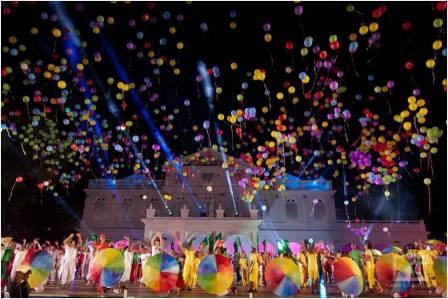As evening fell on Friday, thousands of spectators packed around Paramaribo’s Independence Square witnessed a grand display of arts and culture to open Carifesta XI.
The ceremony to open the 10-day festival of arts enthralled those in attendance with standout performances by Shaolin monks, who performed as a gift to Suriname from the Chinese people and 340 children between the ages of six and 16 stormed the stage in a dance of colour and light.
The ceremony began with performances from both the Surinamese police service and army bands which marched along the stage and dancers highlighted the host nation’s multicultural heritage, including the Javanese, Amerindian, Hindustani, Chinese, Creole, Maroon and European influences.
The Independence Square was transformed into an arena, with seating for 10,000 spectators on wooden pavilions surrounding the stage specially built for the festivities in front of the lit Presidential Palace. A lightshow illuminated on the white backdrop of the palace was among the highlights as was the parade of participating nations.

However, even after the ceremony started, masses of people who could not gain entrance into the arena were pushing the eight-foot high barricades in order to enter. Local officers rushed to the scene to keep them back and security was increased drastically as civil officers lined the boundaries of the square to ensure order.
Suriname President Desi Bouterse, who declared the festival open, told spectators that the country is ready to demonstrate how to strengthen ties between people across borders, while observing that Carifesta can bring people from all corners of the world to share Caribbean creativity.
“We express creativity, strength, motivation and endurance. “Culture is an important cornerstone of a healthy society. Taking into account only the economic and social factors, without paying attention to the cultural perspectives, will not be sustainable for development on the long term,” he said, in an address that was entirely in English, save for a brief minute in Dutch which was welcomed by his Surinamese people.
Meanwhile, in his address, Caricom Secretary-General Ambassador Irwin LaRocque emphasised that the celebration of arts and culture is taking place alongside an exploration of the business of culture and the way in which the development of cultural and creative industries can help to realise prosperity.
“Prosperity is our mission,” he declared, while explaining that Carifesta is undergoing a transformation to position it as a space where Caribbean culture and the arts can be promoted to help to improve the economic viability of Caricom member states.
Towards this end, he noted the “Caribbean Marketplace for the Arts” at this year’s Carifesta seeks to provide opportunities for the further professional development of young artists. “…We welcome international industry executives, festival managers, booking agents, promoters and producers to Carifesta XI to generate business for our artists through networking and new partnerships,” he added.
Ambassador LaRocque added that what makes this year’s celebration even more special is that it is one of the highlights of the celebrations to mark Caricom’s 40th Anniversary, thereby providing an opportunity to on integration. He also singled out then Prime Minister of Guyana, Forbes Burnham, whom he described as one of the architects of our regional integration movement and who was one of the signatories to the Treaty of Chaguaramas in 1973, for recognising the importance of culture in bringing people together. He said Burnham responded to the request of a group of writers to introduce Carifesta as a forum where artists and the people of the Region could come together to celebrate regional culture and diversity. “He recognised the role of our culture, our people and how our identities are important in the integration process; he understood the importance of education and the arts,” he said.
Suriname’s Minister of Education and Community Development Ashwin Adhin reflected on the theme of the festival—Culture for Development—and he observed that a region blessed with huge potential to develop its many resources, cannot be successful without the development of its people. “We can create artistic beauty and combine ideas and turn them into sustainability and productivity for a stronger, united Caribbean,” he said, while stressing that Carifesta dwells on socio-economic development and looks to eliminate doubts that culture and development are separate. “It is obvious that the great job has been done in integrating the nations of Caricom through Carifesta,” Adna said, while promising that art would burst forth from the inner city of Paramaribo.
After a dramatic presentation which led into an opera and then a dance, there was a countdown among spectators who unleashed confetti blasts, balloons and fireworks all over the arena.
The countries participating in this year’s festival are: Antigua and Barbuda; Argentina; Barbados; Belize; Grenada; Brazil; China; Columbia; Cuba; Guyana; Curacao; the Dominican Republic; French Guiana; Haiti; India; Indonesia; Jamaica; Mexico; South Korea; St Kitts and Nevis; St Lucia; St Vincent and the Grenadines; Trinidad and Tobago; Venezuela; and Suriname.




